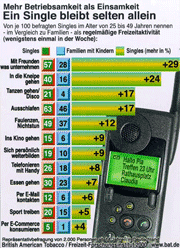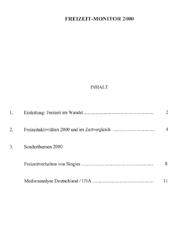Leisure Time Monitor 2000
More hustle and bustle than loneliness. A single person rarely stays alone
More and more people are living alone. The number of single households is growing at an unprecedented rate and has more than quintupled in the last hundred years. One of the main reasons for the increase in people living alone is the social valorisation of being single. More and more people are enjoying single life to the full. Compared to family households, for example, singles go to the pub significantly more often (40% - families 16%) and go to the cinema more often (15% - families: 6%). And they also spend twice as much time socialising with friends (57% - families: 28%). These are the findings of the recently published annual "Leisure Time Monitor 2000", in which the Leisure Time Research Institute of British American Tobacco has been surveying a representative sample of 2,000 people aged 14 and over in Germany about their leisure activities since 1995.
"Singles are considered to be the pampered children of the consumer society because they fuel consumption and can lead a life of round-the-clock consumption," says Prof Dr Horst W. Opaschowski, Director of the Institute. "The cliché about being single is largely in line with the reality of today". Singles aged 25 to 49 are on a spending spree like no other population group: one in five singles regularly goes to the disco (21%) and almost one in three (30%) goes out to eat as a weekly leisure activity.
As lonely as singles may be within their own four walls, they are just as sociable and sociable in public. Most leisure activities take place "with friends". The rest of the time they do a lot for themselves, mainly sleeping in (63%), lazing around (49%) and occasionally doing sport (20%). Singles invest significantly more time than families in personal development (19% - families: 10%).
More e-communication than e-commerce
They regularly use their mobile phones as a bridge to the outside world. And they are discovering e-mail as a new means of communication (12% - families: 6%). Professor Opaschowski: "For some singles, email is like a motorway - once it's there, the traffic comes all by itself."
Singles can use e-mail to build new relationship networks without having to make a long-term commitment. The age of electronic communication has only just begun for them. Opaschowski: "For people living alone, e-communication will become more important than e-commerce in the future." For them, mobile phones and PCs are primarily a means of communication and only occasionally a shopping platform.
The new comprehensive data volume "Freizeit-Monitor 2000" contains - listed according to socio-demographic characteristics such as gender, age, education, income, stage of life, etc. - detailed information on 59 different leisure activities ranging from television and video, museums and theatre to voluntary work in churches, political parties, trade unions or clubs.
The representative survey of 2,000 people aged 14 and over was conducted in Germany between 17 and 28 August 2000.
The data volume "Freizeit-Monitor 2000" is available immediately for a nominal charge of DM 98.00 from B-A-T Freizeit-Forschungsinstitut GmbH, Alsterufer 4, 20354 Hamburg (Fax 040/ 4151 32 31).
See also directory of all publications




